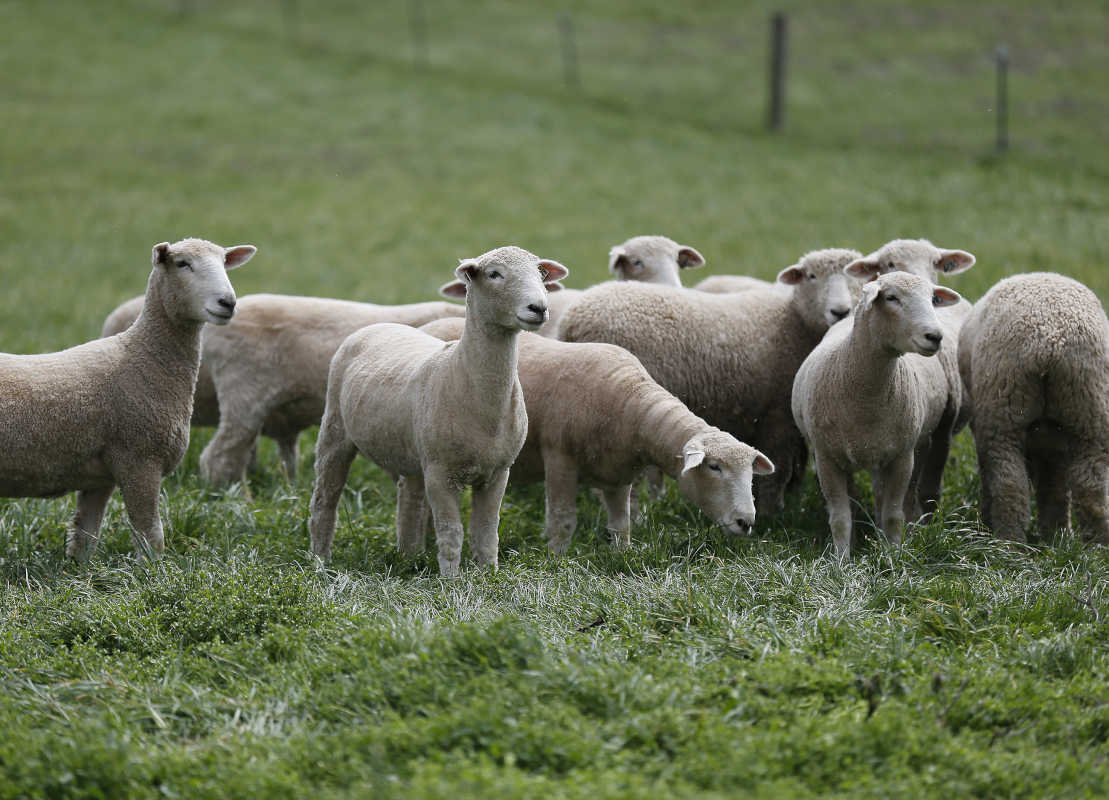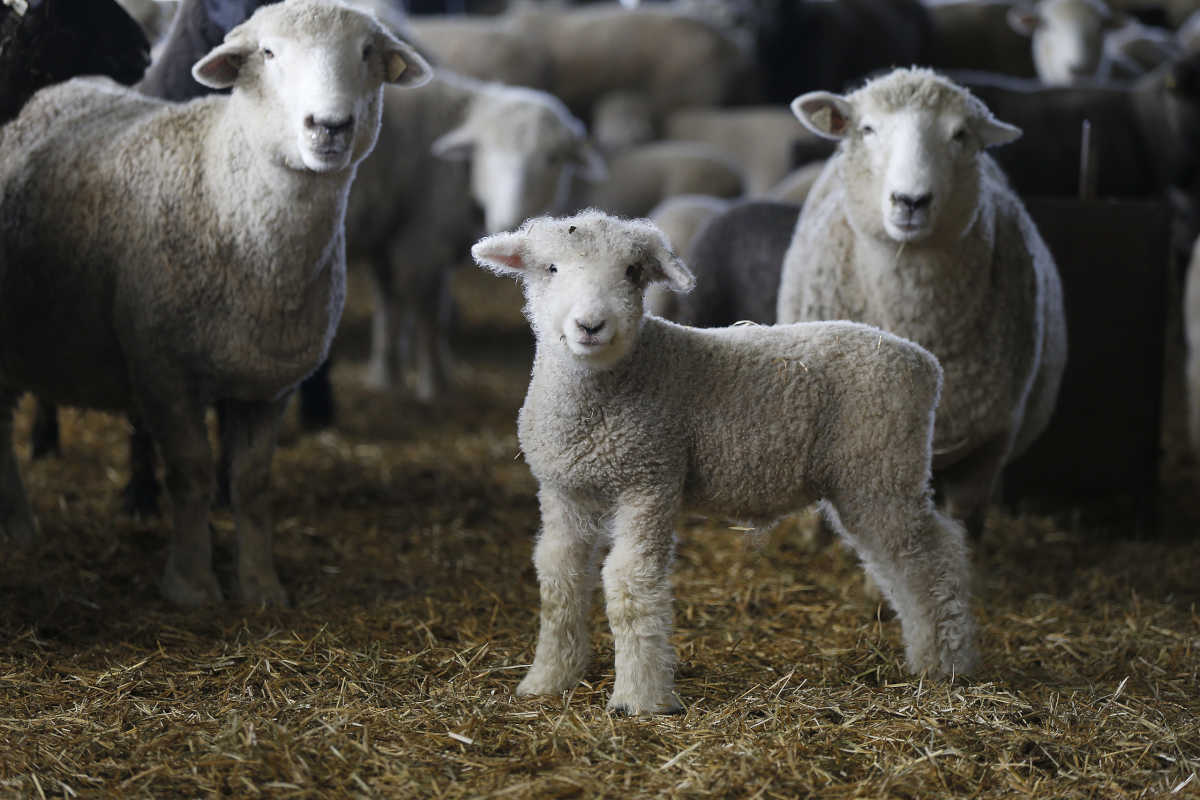In the middle of a fast-developing town known for its desirable zip code is a sheep farm believed to be the largest in South Jersey – and you wouldn’t know it’s there.
Little Hooves farm in Moorestown is where a flock of 300 sheep and lambs thrive mostly out of sight, inside three sprawling dairy barns that decades ago held cows. The sheep have been there for more than a dozen years. Sometimes they can be seen on pastures that border a two-lane country road that’s gradually becoming less peaceful.
The farm is among the last in Moorestown. One reason sheep farms survive is the state’s ethnic diversity, which drives a demand for the meat, state agriculture experts say. Muslims, Orthodox Greeks, Hispanics, and some Middle East and Asian immigrant communities favor market lamb — especially during the Easter season and other religious holidays.
“Easter is one of our peak times. But it keeps going with Orthodox Easter, Muslim holidays, and even the Fourth of July, when people can roast lamb on a spit or a grill,” said Charlene Carlisle, a part-time intensive-care nurse at Virtua Hospital who operates the Little Hooves farm off Centerton Road.
Nationwide, sheep inventory has been declining for decades, but New Jersey is enjoying a small uptick. The state had nearly 15,000 sheep in 2012 and was ranked fifth in the nation in the production of market lamb and mutton in 2015, according to the latest U.S. Department of Agriculture figures. Pennsylvania, however, had a decrease in market sheep in 2015.
Little Hooves has carved out a niche in Moorestown while other farms have disappeared. But across the street, workers for Toll Brothers hammer away at a new development of luxury homes, the Mews at Laurel Creek. The 250-acre farm has an executive office campus on one side and community gardens on the other.
This time of year, the farm contributes to the bustle.
Consumers can buy market lambs and wool products directly from the doorstep of the farm or from the nearby Burlington County Farmers Market.
Carlisle tends to the animals, while her husband, Kenneth, grows mostly hay, soybeans, and corn on the acres they lease from the county under a farmland preservation program, and from several landowners.
“I don’t require much sleep,” she said, laughing. Carlisle also said sheep are “fairly easy” to raise since they only need to be fed twice a day.
Carlisle says the new focus on farm-to-fork and fresh, locally produced meats and vegetables has also helped their business grow. “There’s definitely an increased interest with people wanting to feel connected, wanting to know where their food comes from,” she said, noting she doesn’t give her sheep any hormones.
She sells market lambs to restaurants and to consumers at the farmers market.
The farm also sells prize-winning sheep for breeding and for so-called gentleman’s farms that use small flocks of sheep to get tax breaks.
The Carlisles have been farming at this Moorestown site for 30 years, including more than a decade when the couple worked for the Winner dairy farm, which once had 400 Holstein cows on the property. Now, they raise only sheep, which Carlisle described as more pleasing to residential neighbors who have moved into the area. “There is less smell and manure, since sheep poop is like rabbit poop,” she said.
Carlisle also markets wool, yarn, and pelts online.
“We’re probably the largest sheep farm around except for the one in North Jersey,” she said. That farm, Valley Shepherd Creamery, in Long Valley, Morris County, has about 500 milking sheep used in a commercial cheese operation.
Nationwide, there were about eight million sheep and lambs in 1997, and only about 5.3 million this year due partly to decreased demand. In 1997, New Jersey had 12,900 sheep, and 14,900 by 2012, on 819 farms.
The majority of those farms had fewer than 25 sheep and lambs. Only a dozen had more than 100.
Among the smaller ones is the Square Key Farm in Pedricktown, Salem County, which has about 70 sheep and lambs. “I focus on meat lambs that look nice on the table,” said Ed Hall Jr., the owner. He supplies a few Philadelphia and Delaware restaurants and sells directly to customers who then take the animals to a butcher.
“I’m not struggling, because it’s a unique market,” Hall said. There also are challenges. Hall won’t be able to capitalize on the Easter market this year because his ram became sterile and his lambs were born too late. “I’m not rich, but I’m paying my bills and I’m happy and doing well,” he said.
Dan Wunderlich, a New Jersey Department of Agriculture livestock specialist, said the state had the distinction of being fifth in the nation in the number of sheep and lambs that were slaughtered in 2015 in federally inspected facilities and then marketed. There were 126,000 market sheep in that category, up 5 percent from the previous year.
That number, the latest available, represents sheep raised in the state for meat along with those imported from other states.
New Jersey “has the market, and the population, and ethnic diversity and relies on Pennsylvania, New York, Delaware, and Maryland for a supply of live animals,” Wunderlich said.
In 2015, Pennsylvania processed only 61,100 sheep for meat, a 15 percent decrease from the previous year, the USDA reported. Wunderlich said that state likely exports many of its sheep to states like New Jersey that have the diversity and the customers.
Currently, New Jersey has 13 federally inspected sheep and lamb meat processing facilities. Catelli Brothers in Camden is among them.
Wunderlich said a growing number of farmers also deal directly with consumers, who may take the animals to butchers or a non-regulated facility. Muslims sometimes purchase the lambs and take them to a special halal butcher.
As for wool products, Wunderlich said they provide “less of a boon” because consumers often purchase synthetics and washable fabrics.
Carlisle said her wool is sold mostly to consumers interested in warm blankets and others interested “in getting back to natural fibers.”
She said the county farmers market, which opened about 10 years ago, also has helped give her business a financial boost. It is open only on Saturdays, in the summer.
“It gives us a way to educate the public,” she said.




